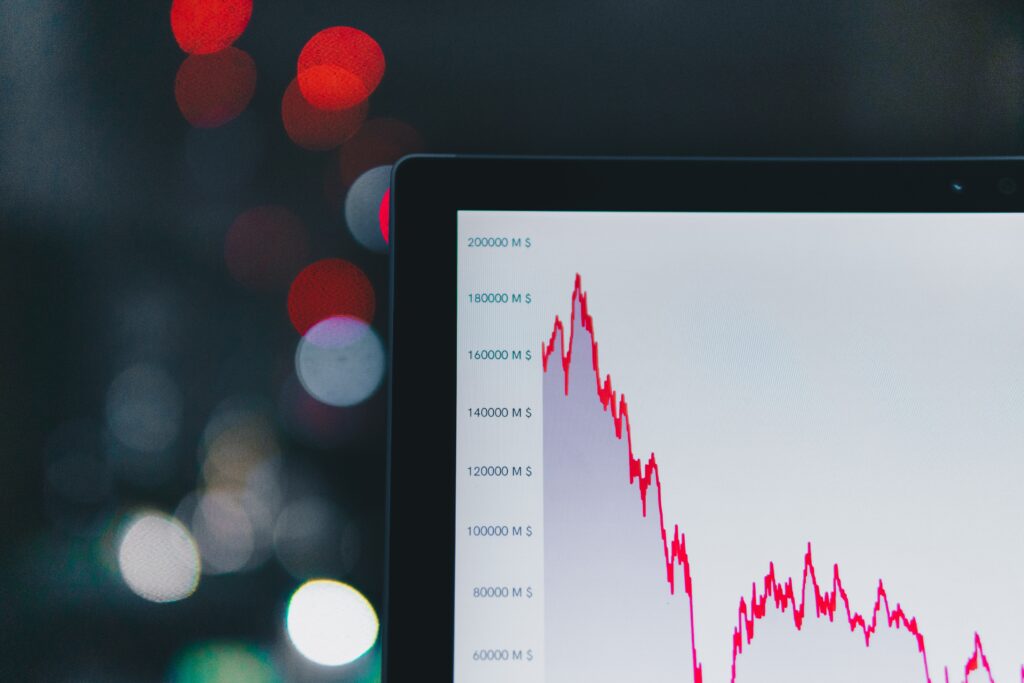Disclaimer: The content provided in this article is intended for general informational purposes only and should not be construed as financial advice. The analysis presented is based on cyclical patterns in historical revenue data, which may not be applicable to specific financial situations or investment decisions. Readers are advised to conduct their own research and consult with qualified financial professionals before making any investment or business choices. The author and Cycle Quest shall not be held responsible for any losses, damages, or liabilities resulting from the use of the information presented in this article. Additionally, past performance or historical trends are not indicative of future results. Individual circumstances and market conditions may vary, so exercise caution and judgment when applying the insights discussed in this article.
In the ever-changing landscape of the stock market, successful investors understand the importance of recognizing patterns and trends. One such pattern is the cyclical nature of certain stocks and industries, which are highly sensitive to changes in the broader economy. These stocks can either thrive or suffer during different phases of the economic cycle, offering informed investors potential opportunities for both profit and risk.
Cyclical stocks belong to industries that have a close correlation with the overall economic health and tend to follow a predictable pattern of ups d downs alongside economic expansions and contractions. Industries such as manufacturing, housing, automobiles, travel, and retail are classic examples of cyclical sectors. By understanding the characteristics of these stocks, investors can strategically position themselves to make informed investment decisions.
During periods of economic expansion, cyclical stocks tend to perform exceptionally well. As economic conditions improve, consumer confidence increases, and people are more willing to spend on non-essential purchases. This translates into higher demand for the products and services offered by cyclical companies, boosting their revenues and driving up stock prices. For example, industries like consumer discretionary, automotive, travel, and tourism may experience significant growth during these periods.
Conversely, during economic contractions or recessions, cyclical stocks tend to face more challenging times. With consumers tightening their belts and cutting back on discretionary spending, the demand for non-essential products and services diminishes. As a result, cyclical companies may experience declining revenues and reduced profitability, leading to a decrease in their stock prices. Industries like travel and leisure, luxury goods, and housing may suffer during these economic downturns.
Identifying cyclical stocks is not always a straightforward task. However, there are several indicators that can assist investors in spotting these opportunities. Monitoring economic conditions and key economic indicators such as employment rates, inflation rates, and interest rate hikes can provide valuable insights into the current phase of the economic cycle. Understanding how these factors impact specific industries and their potential for growth or decline can help investors identify cyclical stocks.
Additionally, analyzing the beta values of stocks can be beneficial in identifying their sensitivities to broader market movements. High-beta stocks tend to be more volatile and sensitive to economic fluctuations, often indicating cyclical tendencies. On the other hand, low-beta stocks, also known as defensive stocks, remain relatively stable and less impacted by economic cycles.
Before making any investment decisions, it’s crucial to conduct thorough research and consider the company’s financial health, future prospects, and ability to weather different economic conditions. The independence of investment research and seeking advice from a qualified investment adviser should always be part of an investor’s strategy.
While investing in cyclical stocks carries its potential rewards, it is important to remember that the stock market can be unpredictable. Profits are not guaranteed, and investors should always be prepared for the possibility of losses. Being mindful of these risks, along with an understanding of the cyclical nature of certain stocks, can help investors navigate the market with a more informed outlook.
Table of Contents

What is a cyclical stock?
A cyclical stock is a type of stock that follows a pattern of ups and downs in alignment with changes in the broader economy. These stocks are typically found in industries such as manufacturing, housing, automobiles, travel, and retail. Understanding the cyclical nature of certain stocks can provide valuable insights for investors.
Cyclical stocks tend to perform well during periods of economic expansion. This is because consumer spending increases, leading to higher demand for the products and services offered by these companies. However, during economic contractions or recessions, cyclical stocks may face more challenging times as consumers cut back on discretionary spending.
It is important for investors to monitor key economic indicators such as employment rates, inflation rates, and interest rate hikes. These factors can provide insight into the current phase of the economic cycle and help identify potential opportunities or risks in cyclical stocks.
While seeking the assistance of advisory services like Cycle Quest can offer valuable insights and recommendations on identifying and analyzing cyclical stocks, it is essential to conduct thorough research and exercise independent judgment before making any investment decisions. Remember, investing in stocks involves risks, and it is important to make well-informed decisions based on your own analysis and understanding of the market.
How do cyclical stocks work?
Cyclical stocks operate in tandem with the broader economic cycle. They are companies whose performance is closely tied to the fluctuations of the economy. During periods of economic expansion, when consumer spending and confidence are high, these stocks tend to thrive. This is because consumers are more likely to purchase discretionary goods and services, such as travel, luxury items, and entertainment.
However, during economic contractions or recessions, cyclical stocks face more challenging times. As consumers tighten their belts and prioritize essential expenses, demand for discretionary products and services decreases. This can have a significant impact on the revenue and profitability of cyclical companies.
To understand how cyclical stocks work, investors should pay attention to key economic indicators and trends, such as employment rates, inflation rates, and interest rate hikes. These factors can provide valuable insights into the current phase of the economic cycle and help investors assess the potential risks and opportunities associated with cyclical stocks.
It is important to note that investing in cyclical stocks involves risks and uncertainties. The performance of these stocks is heavily influenced by external economic factors, making them prone to volatility. Therefore, conducting thorough research and analysis is crucial before considering investment in cyclical stocks.
Cyclical vs. Non-cyclical Stocks
Cyclical stocks and non-cyclical stocks are two categories that investors use to categorize companies based on their sensitivity to economic cycles.
Cyclical stocks are those that tend to perform well during periods of economic expansion and growth. These stocks are usually found in industries such as consumer discretionary, technology, and industrials, where consumer demand for non-essential products and services is high. During economic contractions, however, the demand for these products and services tends to decrease, leading to potential challenges for cyclical companies.
On the other hand, non-cyclical stocks, also known as defensive stocks, are companies that tend to have more stable performance regardless of the economic conditions. These stocks are typically found in industries such as consumer staples, healthcare, and utilities, where consumer demand for essential products and services remains relatively consistent.
Investors can spot cyclical and non-cyclical stocks by analyzing the trends and patterns in the industries and sectors in which these companies operate. They should also pay attention to key economic indicators and trends to assess the potential risks and opportunities associated with each type of stock.
Remember, investing in stocks involves risks, and it is important to do thorough research and consult with a financial advisor before making any investment decisions.
Are banks cyclical stocks?
Banks are often considered cyclical stocks due to their sensitivity to economic conditions. During periods of economic expansion and growth, banks tend to benefit from increased lending activities, higher interest rates, and strong corporate profits. This can result in higher revenues and earnings for banks, leading to potential growth in their stock prices.
However, during economic contractions and tough times, banks may face challenges such as higher loan defaults, lower interest rates, and reduced consumer spending. These factors can impact their profitability and can lead to a decrease in their stock prices.
It’s important to note that the cyclical nature of banks can also be influenced by various factors such as government regulations, central bank policies, and overall market sentiment. Therefore, while banks are often classified as cyclical stocks, it’s important for investors to conduct thorough research and analysis to evaluate the specific conditions and factors affecting individual banks before making any investment decisions.
Example of Cyclical Stocks
Cyclical stocks are a category of stocks that tend to follow economic cycles. These stocks are highly influenced by changes in economic conditions, such as expansions and contractions. They typically perform well when the economy is expanding and consumer spending is high but can face challenges during economic contractions.
For instance, two stocks that are normally considered cyclical in nature are Caterpillar Inc. (CAT) and Ford Motor Company (F).
Caterpillar, a global leader in construction and mining equipment, tends to experience fluctuations in its stock price that coincide with changes in the business cycle. During economic expansions, demand for construction equipment increases, driving up Caterpillar’s revenues and stock prices. Conversely, during economic downturns, demand weakens, impacting the company’s performance.
Similarly, Ford, a renowned automaker, follows a cyclical pattern due to its dependence on consumer spending and economic conditions. In times of prosperity, consumers are more likely to buy new cars, boosting Ford’s sales and stock value, while during economic downturns, car purchases tend to decline, affecting the company’s bottom line.
It’s important to note that investing in cyclical stocks can be risky due to their sensitivity to economic conditions. Therefore, it’s crucial for investors to thoroughly research and analyze individual companies and economic indicators before making any investment decisions.
Advantages and Disadvantages of Cyclical Stocks
Cyclical stocks are an interesting investment option that comes with both advantages and disadvantages. Here are some key points to consider (click on each of them to find out more):
During periods of economic expansion, cyclical stocks have the potential to deliver significant returns. As the economy grows, consumer demand for cyclical products and services, such as automobiles, luxury goods, and travel, tends to increase, leading to higher revenues and profits for the companies in these sectors.
Successfully investing in cyclical stocks requires accurate timing. It can be challenging to predict the exact timing of economic cycles and the performance of cyclical industries, making it difficult to consistently generate profits from these investments. In this case, Cycle Quest can certainly give you the extra tools you need to improve your decision timing.
During periods of economic recession, cyclical stocks may face significant challenges as consumer spending on discretionary items slows down. This can result in prolonged periods of underperformance for these stocks, making them less attractive to investors seeking stability and steady returns.
While cyclical stocks offer the potential for high returns and dividend opportunities, their volatile nature and dependence on economic cycles make them a more challenging investment option. Investors should carefully consider the advantages and disadvantages before deciding to include cyclical stocks in their portfolios.
What are the cyclical stock sectors?
Cyclical stock sectors are industries that tend to follow the ebbs and flows of the overall economy. These sectors experience fluctuations in demand and profitability in line with the business cycle.
Common examples of cyclical stock sectors include:
The materials sector includes companies involved in the extraction and processing of raw materials. These stocks often fluctuate with changes in commodity prices and global demand. They can benefit from increased infrastructure spending but may face challenges during economic downturns when demand for raw materials declines.
It’s important to note that the classification of sectors as cyclical can vary depending on the source and methodology used. Investors should conduct thorough research and analysis before making any investment decisions.
Where can I find lists of cyclical stocks?
Finding lists of cyclical stocks can be helpful for investors looking to identify potential investment opportunities. While it is important to remember that market conditions and individual stock performances can vary, there are several sources where you can find lists of cyclical stocks.
Engaging with financial advisors or participating in online investing forums can offer perspectives and recommendations on cyclical stocks. However, it is important to seek trusted sources and consider various opinions before making any investment decisions.
Remember, while lists of cyclical stocks can be informative, it is crucial to conduct your own research and carefully analyze individual companies before making any investment decisions.
How To Invest In Cyclical Stocks
Investing in cyclical stocks requires a thorough understanding of economic cycles and the industries that are typically affected by them. While it can be challenging to accurately predict market trends and timing, there are a few strategies that can help identify potential cyclical stocks:
Certain sectors tend to be more cyclical than others. Industries such as consumer discretionary, technology, industrials, and materials are typically more sensitive to economic conditions. Researching these sectors and identifying companies that operate within them can provide insights into potential cyclical investments.
Reviewing a company’s historical performance, particularly during economic downturns, can help assess its cyclical nature. Companies that experience larger swings in earnings and stock prices during tough times may be considered more cyclical.
Beta values measure a stock’s sensitivity to market fluctuations. Stocks with a beta greater than 1 tend to be more volatile and may exhibit cyclical characteristics. However, it’s essential to remember that beta values are just one tool and should not be the sole basis for investment decisions.
Investing in a diversified portfolio can help mitigate the risks associated with cyclical stocks. By spreading investments across various sectors and industries, you can potentially offset any losses from cyclical stocks with more stable returns from non-cyclical stocks.
Remember, investing in cyclical stocks comes with inherent risks and uncertainties. It is crucial to conduct thorough research, consider various factors, and consult with a financial advisor before making any investment decisions.
Who Should Invest in Cyclical Stocks?
Cyclical stocks are not suitable for every investor and should be approached with caution. These stocks are highly sensitive to changes in the economy and can experience significant volatility. Therefore, individuals who have a higher risk tolerance and a longer investment time horizon may be more inclined to invest in cyclical stocks.
Investors who closely monitor economic indicators and possess a deep understanding of economic cycles may be better equipped to identify and capitalize on opportunities in cyclical stocks. They can analyze factors such as GDP growth, employment rates, and inflation rates to gauge the health of the economy and make informed investment decisions.
You can refer to Cycle Quest’s long experience to better analyze the cyclical pattern of a stock. However, always remember to use the research provided by experts as a tool, as the choice on whether to invest or not in a company will always be yours.
Additionally, individuals who are willing to conduct thorough research and analysis on specific sectors and industries may find cyclical stocks appealing. Sectors such as consumer discretionary, technology, industrials, and materials are typically more cyclical, and investors who specialize in these areas may have an advantage in identifying potential winners.
What are counter-cyclical stocks?
Counter-cyclical stocks, also known as defensive stocks, are a type of investment that tends to perform well during economic downturns or periods of market volatility. Unlike cyclical stocks, which are closely tied to the overall economy and perform well during periods of economic expansion, counter-cyclical stocks are considered to be more resilient and can provide stable returns even during tough times.
Typically, counter-cyclical stocks belong to industries that offer products or services that are essential to consumers regardless of economic conditions. These industries include sectors such as consumer staples, healthcare, and utilities. Companies in these sectors tend to have steady demand for their products, as consumers continue to require essential goods and services regardless of the state of the economy.
Investors seeking stable returns and protection against downturns may find counter-cyclical stocks appealing. However, it is important to note that while these stocks may provide stability during tough economic times, they may not generate significant growth during periods of economic expansion. As with any investment, thorough research and analysis should be conducted, and individuals should consider their own financial goals and risk tolerance before making any investment decisions.
Final Thoughts
Spotting cyclical stocks can be a useful skill for investors who want to understand the dynamics of the stock market. While non-cyclical stocks may offer stable returns regardless of economic conditions, cyclical stocks can provide opportunities for growth during times of economic expansion.
One way to identify cyclical stocks is to analyze the industries they belong to. Sectors such as consumer discretionary and technology tend to be more sensitive to economic cycles, as they rely heavily on consumer spending and corporate profits. These stocks may experience significant fluctuations in stock prices during economic downturns but can also see substantial gains when the economy is booming.
Additionally, understanding the beta value of a stock can provide insight into its cyclical nature. Stocks with a beta value greater than 1 tend to be more volatile and have a stronger correlation to the overall market. On the other hand, stocks with a beta value of less than one may be less affected by economic fluctuations.
It’s important to remember that investing in cyclical stocks comes with risks. Economic downturns can significantly impact the performance of these stocks, and their success often relies on accurate predictions of economic conditions. Therefore, it’s crucial for investors to thoroughly research and consider their investment strategies before entering the market.
In conclusion, recognizing cyclical stocks and understanding their characteristics can help investors make informed decisions in a dynamic market. However, it’s essential to approach these investments with caution and seek advice from independent investment research or a trusted investment adviser.

Cycle Quest – Your Partner in Cyclical Analysis
If you’re looking to identify cyclical stocks, Cycle Quest has got you covered with their personalized analysis services. Whether you’re a business owner, investor, or simply curious about the market, their team of expert advisors can help you improve the timing of your strategy.
To get started, here’s a straightforward 3-step process before reaching out to Cycle Quest:



Discover the power of cyclical analysis in various fields, such as business, investments, sports, and science, by reaching out to us.
At Cycle Quest, we specialize in revealing hidden cyclical patterns within your data. Let us be your trusted guide to gaining a competitive edge and optimizing your strategies for success.

